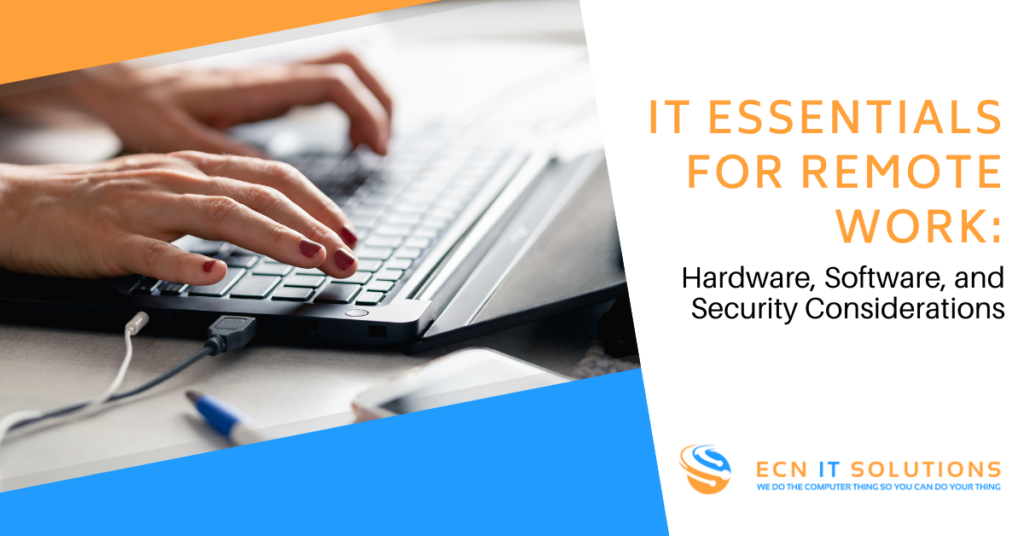The rise of remote work has transformed the modern business landscape. Gone are the days of centralized workforces confined to physical office spaces. Today, employees can work productively from anywhere with an internet connection.
However, this shift necessitates careful consideration of essential IT infrastructure to ensure a secure, efficient, and productive remote work environment. This guide covers the fundamental hardware, software, and security considerations for a successful remote work setup.
Hardware Essentials
The right hardware is the foundation of an efficient remote work environment. Here are the key components to consider.
1. Reliable Computers
A reliable computer is the cornerstone of remote work. Depending on the nature of the job, employees may need either desktops or laptops. Laptops offer portability, which is ideal for employees who need to work from various locations.
Key factors to consider include processing power, memory (RAM), storage capacity, and battery life. For most remote workers, a computer with at least an 8GB of RAM, and a solid-state drive (SSD) is recommended.
2. High-Quality Monitors
While laptops come with built-in screens, additional monitors can enhance productivity by providing more screen real estate. Dual monitor setups are particularly useful for tasks that involve multitasking or working with large spreadsheets and documents. Monitors with Full HD (1080p) or higher resolution provide clear and crisp visuals.
3. Webcams and Headsets
Effective communication is crucial for remote work. High-quality webcams and headsets with noise-canceling microphones ensure clear video and audio during virtual meetings. Built-in laptop webcams and microphones may suffice for casual use, but dedicated devices offer better quality and reliability.
4. Ergonomic Accessories
To maintain comfort and prevent strain, ergonomic accessories are essential. This includes adjustable chairs, desks, keyboard trays, and mouse pads. Investing in ergonomic furniture and accessories can significantly improve employee well-being and productivity.
5. Networking Equipment
Stable and fast internet connectivity is vital for remote work. Employees should have access to high-speed internet and reliable networking equipment, such as modern routers and Wi-Fi extenders. For tasks that require high bandwidth, wired connections are preferable to wireless ones.
Software Essentials
The right software enables seamless collaboration, communication, and productivity for remote workers. Here are some key software tools.
1. Communication Tools
Effective communication tools are the backbone of remote work. Platforms like Microsoft Teams, Slack, and Zoom facilitate instant messaging, video conferencing, and team collaboration. These tools help maintain a sense of connection and teamwork among remote employees.
2. Project Management Software
Project management tools like Asana, Trello, and Monday.com help teams organize tasks, set deadlines, and track progress. These tools provide visibility into project status and ensure that everyone stays on the same page, even when working remotely.
3. Cloud Storage and Collaboration
Cloud storage solutions such as Google Drive, Dropbox, and OneDrive allow employees to store, share, and collaborate on files in real time. These platforms support version control and ensure that documents are accessible from anywhere, at any time.
4. Productivity Suites
Comprehensive productivity suites like Microsoft 365 and Google Workspace offer a range of applications for word processing, spreadsheets, presentations, and email management. These suites integrate seamlessly with other tools and provide essential functions for daily tasks.
Security Considerations
Ensuring the security of remote work environments is paramount. Here are the key security measures to implement.
1. Virtual Private Networks (VPNs)
VPNs provide secure, encrypted connections between remote workers and the company network. This protects sensitive data from being intercepted by cybercriminals and ensures that employees can safely access company resources.
2. Endpoint Security
Endpoint security solutions, such as antivirus software and firewalls, protect devices from malware and other threats. Ensuring that all devices used for remote work have up-to-date security software is essential.
3. Multi-Factor Authentication (MFA)
MFA adds an extra layer of security by requiring users to verify their identity through multiple methods, such as passwords and mobile authentication apps. Implementing MFA for accessing company systems and applications reduces the risk of unauthorized access.
4. Data Encryption
Encrypting sensitive data both at rest and in transit protects it from unauthorized access. This includes using encryption for emails, files, and communications platforms.
5. Regular Security Training
Employees should be regularly trained on security best practices, including recognizing phishing attempts, using strong passwords, and securing their devices. Regular training helps maintain a security-conscious workforce.
6. Access Controls
Implementing strict access controls ensures that only authorized personnel can access sensitive information. Role-based access controls (RBAC) can help manage permissions and limit access based on job responsibilities.
Best Practices for Remote Work
In addition to the hardware, software, and security measures outlined above, adopting best practices can further enhance the remote work experience:
- Develop clear remote work policies that outline expectations.
- Have regular check-ins between managers and team members.
- Promote a collaborative culture.
- Establish a consistent process for communicating tasks and progress.
- Ensure that employees have access to reliable technical support.
Need Help with Remote Team Technology and Support?
Setting up an effective remote work environment involves a combination of the right hardware, software, and security measures. The experts at ECN IT Solutions can help your Tucson area business by ensuring you have the right IT infrastructure to promote both productivity and security no matter where employees work.
Give us a call to start the discussion at 520-355-7553 or reach us online.

